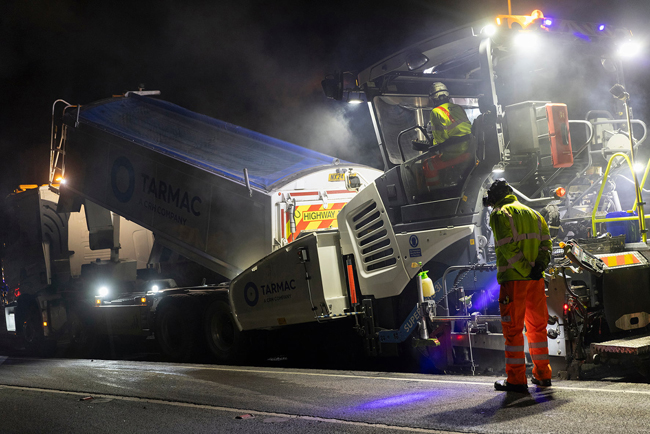A trial on the A64 near Leeds has delivered what is thought to be the UK’s lowest level of carbon emissions for a resurfacing scheme on the strategic road network (SRN) without using carbon offsetting.
The company said that alongside National Highways and supply chain partners it successfully reduced carbon dioxide emissions on the project by 75% compared to a traditional maintenance project of a similar scale, saving more than 260 tonnes of carbon.
The 75% carbon saving cited compares with a project on local roads carried out by Tarmac in the North East last year, which it said reduced emissions ‘up to 80%’.
The trial – the first of its kind on the strategic network – was delivered on a 1.5-mile section of the A64 eastbound carriageway at Junction 44 near Bramham in Yorkshire.
Over seven days the team, including HW Martin, Premier Roadmarkings, Kier and Mway Comms, combined a range of innovative low carbon materials, paving technology and plant.
Overall, 41.3% of the project’s carbon reduction total was delivered using low carbon raw materials, 14.7% from the transport of materials and the paving process, including the use of electric plant, and 44% from manufacturing techniques.
A warm mix asphalt was used with a pioneering ‘carbon sink’ bio-component binder from Shell, while the lower layer of the pavement used 40% recycled asphalt planings with a further 20% in the surface course.
A number of zero emissions plant vehicles and prototypes were used, including electric and hybrid road rollers and an electric bond coat sprayer. Tarmac’s Cross Green asphalt plant in Leeds, which manufactured many of the materials used on the project, was powered by a combination of biofuel and ‘clean’ electricity.
Other construction methods provided significant benefits such as enhanced pavement life and a high performance, smooth pavement, Tarmac said. This was achieved through continuous paving using the ‘echelon’ paving method.
As eliminating joins reduces water infiltration, the road is expected to last more than 20% longer and require less maintenance.
A 150-metre section utilising all of these technologies but with a standard penetration grade binder and a small percentage of a negative carbon aggregate facilitated what Tarmac said is the UK’s first net zero pavement.

Brian Kent, national technical director at Tarmac, said the trial sets a blueprint for low carbon delivery on the SRN and demonstrates how shorter, more focused works can improve efficiency, boost productivity and minimise night-time closures.
He added: ‘The ambitions of this scheme reflect our commitment to delivering not only low carbon pavements but also the significant benefits of new delivery models which will be essential as part of the transition to net zero.’
Angela Halliwell, National Highways head of carbon and environmental sustainability strategy and planning, said: ‘We hope this project will pave the way for industry-wide changes, resulting in significant carbon savings and improved road surfaces for drivers.
‘National Highways’ carbon management system and low carbon opportunities register capture innovations like those used on this project, with the intention to make them standard procedure across the road network in future.’





